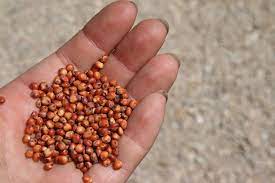No products in the cart.
Discover the Benefits of Sorghum Seed: A Comprehensive Guide
The Ultimate Guide to Sorghum Seed: Everything You Need to Know
Sorghum seed is a fascinating crop that holds numerous benefits and uses. Whether you’re a farmer, a consumer, or simply curious about agriculture, sorghum seed has a lot to offer. In this comprehensive guide, we’ll explore what sorghum seed is, its benefits, how it’s used, and much more. By the end, you’ll have a thorough understanding of this versatile grain.

Table of Contents
| Sr# | Headings |
|---|---|
| 1. | What is Sorghum Seed? |
| 2. | History and Origins |
| 3. | Types of Sorghum |
| 4. | Nutritional Benefits |
| 5. | Growing Sorghum |
| 6. | Uses of Sorghum Seed |
| 7. | Comparison with Other Grains |
| 8. | Environmental Impact |
| 9. | Sorghum in Different Cuisines |
| 10. | Health Benefits of Sorghum |
| 11. | Common Myths and Misconceptions |
| 12. | Sorghum in the Global Market |
| 13. | Sorghum Seed: Challenges and Opportunities |
| 14. | Conclusion |
| 15. | FAQs about Sorghum Seed |
What is Sorghum Seed?
Sorghum seed, scientifically known as Sorghum bicolor, is a cereal grain that belongs to the grass family Poaceae. It is cultivated widely across the world for its grains, which can be used for various purposes, including human consumption, animal fodder, biofuels, and more.
History and Origins
Sorghum has a rich history dating back thousands of years, with origins in Africa and subsequently spreading to other continents. It has been a staple food crop for many cultures and continues to play a crucial role in agriculture today.
Types of Sorghum
There are several types of sorghum, each with unique characteristics and uses. Common types include grain sorghum, sweet sorghum, and biomass sorghum, each cultivated for different purposes ranging from food to renewable energy.
Nutritional Benefits
Sorghum seed is highly nutritious, packed with essential nutrients like proteins, fiber, vitamins, and minerals. It is gluten-free and has numerous health benefits, making it a valuable addition to a balanced diet.
Growing Sorghum
Growing sorghum is relatively straightforward and is adaptable to various climates. It requires minimal water compared to other crops, making it an excellent choice for regions prone to drought.
Uses of Sorghum Seeds
Sorghum seeds is incredibly versatile and can be used in various ways. It is commonly used for human consumption, animal feed, biofuels, and industrial purposes like adhesives and papermaking.
Comparison with Other Grains
Compared to other grains like wheat and rice, sorghum offers unique advantages such as better drought tolerance and higher adaptability to different soil types.
Environmental Impact
The cultivation of sorghum has a positive environmental impact due to its low water and chemical fertilizer requirements, making it a sustainable choice for farmers.
Sorghum in Different Cuisines
Sorghum is a staple in many cuisines around the world, where it is used to make porridges, flatbreads, alcoholic beverages, and more.
Health Benefits of Sorghum
Sorghum offers several health benefits, including improved digestion, lower cholesterol levels, and a reduced risk of heart disease. Its antioxidant properties also contribute to overall health.
Common Myths and Misconceptions
There are several myths surrounding sorghum, such as it being a “poor man’s food” or lacking in nutritional value, which are unfounded and misleading.
Sorghum in the Global Market
The global market for sorghum is growing steadily, driven by its versatility and nutritional benefits. It is increasingly used in gluten-free products and as a sustainable food option.
Sorghum Seeds: Challenges and Opportunities
While sorghum offers numerous benefits, challenges like pests, diseases, and market fluctuations pose threats to its widespread cultivation. However, ongoing research presents opportunities for improvement and innovation.
Conclusion
In conclusion, sorghum seeds is a valuable crop with numerous benefits, both for agriculture and human consumption. Its versatility, nutritional value, and environmental sustainability make it a standout in the world of grains.
FAQs about Sorghum Seeds
Q: What is sorghum- seeds used for? Sorghum -seeds is used for human consumption, animal feed, biofuels, and various industrial purposes.
Q: Is sorghum -seeds gluten-free? Yes, sorghum- seeds is naturally gluten-free, making it a suitable alternative for those with gluten intolerance.
Q: How do you cook sorghum grain? Sorghum grain can be cooked similar to rice or quinoa, by boiling it in water until tender.
Q: Where is sorghum -seeds grown? Sorghum seeds is grown in various regions worldwide, including Africa, Asia, the Americas, and Australia.
Q: What are the health benefits of consuming sorghum -seeds? Consuming sorghum -seeds can improve digestion, lower cholesterol levels, and reduce the risk of heart disease.
This guide has provided an in-depth look into sorghum- seeds, covering everything from its origins and uses to its health benefits and global impact. Whether you’re a farmer, a consumer, or simply curious about agriculture, sorghum -seeds offers something for everyone.
Go and turn on towards organic farming to save future and thire save childs:
Elevate Plant Growth with Premium Bone Powder – Buy Now!
Organic Cow Dung Compost: Transform Your Garden Naturally
Premium Humic Acid for Healthy Plants | Enhance Soil & Boost Growth
Boost Plant Growth Naturally with Mustard Cake | Organic Fertilizer
Transform Your Garden with NPK Fertilizer | Boost Growth by 30%
Premium Perlite for Enhanced Gardening | Buy Now
Live Earthworms with Enhance Your Garden (soil health)
1 Neem Khali: Unveiling the Wonders of Nature
1Transform your garden with vermiwash-buy now
1 Premium quality Vermicompost [ केचुआ खाद ]
Follow us:
Tagged Insorghum seed


